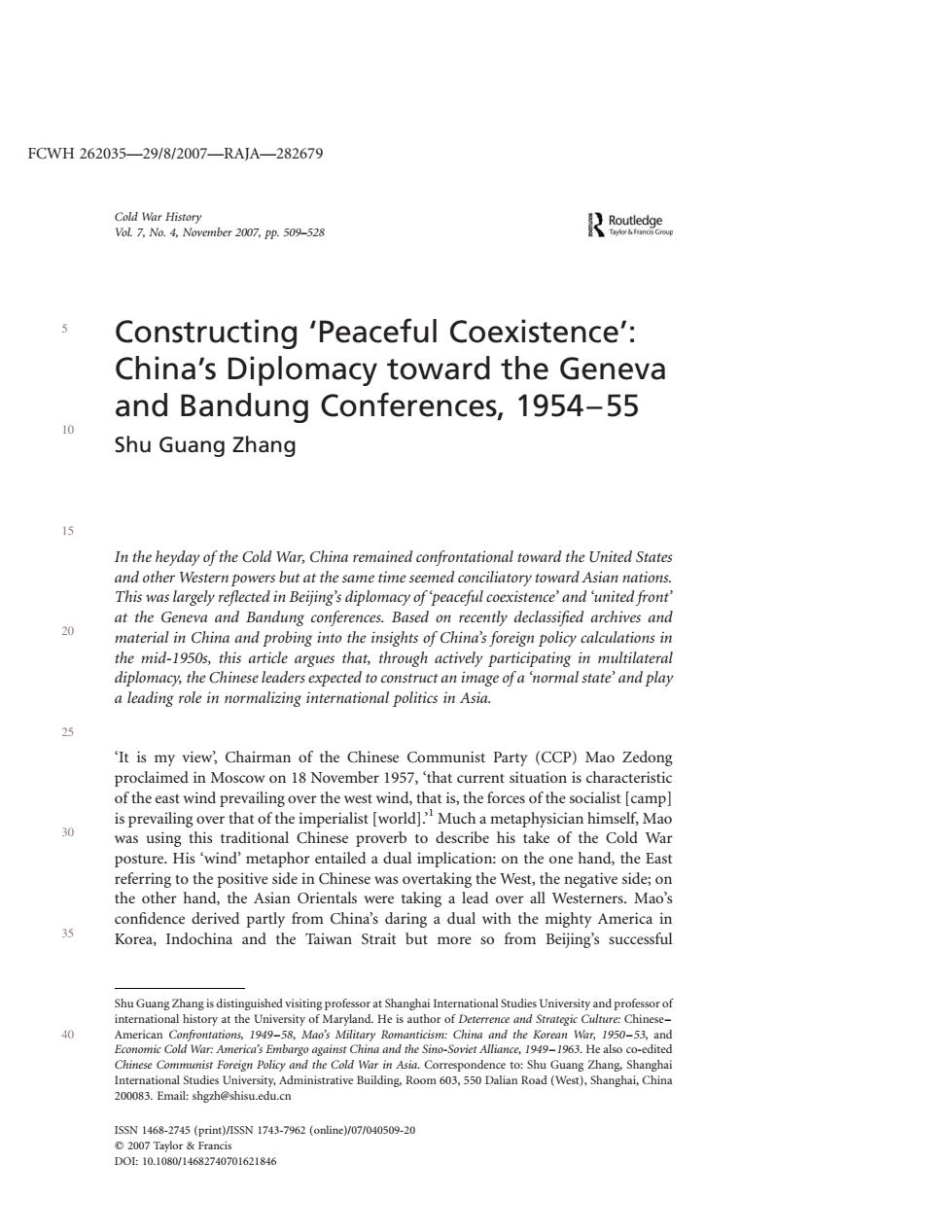正在加载图片...

FCWH262035-29/8/2007-RAJA-282679 Cold War History Vol.7,No.4,November 2007,pp.509-528 oued 5 Constructing 'Peaceful Coexistence': China's Diplomacy toward the Geneva and Bandung Conferences,1954-55 10 Shu Guang Zhang 15 In the heyday of the Cold War,China remained confrontational toward the United States and other Western powers but at the same time seemed conciliatory toward Asian nations. This was largely reflected in Beijing's diplomacy of peaceful coexistence'and 'united front' at the Geneva and Bandung conferences.Based on recently declassified archives and 20 material in China and probing into the insights of China's foreign policy calculations in the mid-1950s,this article argues that,through actively participating in multilateral diplomacy,the Chinese leaders expected to construct an image of anormal state'and play a leading role in normalizing international politics in Asia. 25 'It is my view,Chairman of the Chinese Communist Party (CCP)Mao Zedong proclaimed in Moscow on 18 November 1957,'that current situation is characteristic of the east wind prevailing over the west wind,that is,the forces of the socialist [camp] is prevailing over that of the imperialist [world]."Much a metaphysician himself,Mao 30 was using this traditional Chinese proverb to describe his take of the Cold War posture.His 'wind'metaphor entailed a dual implication:on the one hand,the East referring to the positive side in Chinese was overtaking the West,the negative side;on the other hand,the Asian Orientals were taking a lead over all Westerners.Mao's confidence derived partly from China's daring a dual with the mighty America in 35 Korea,Indochina and the Taiwan Strait but more so from Beijing's successful Shu Guang Zhang is distinguished visiting professor at Shanghai International Studies University and professor of international history at the University of Maryland.He is author of Deterrence and Strategic Culture:Chinese- 40 American Confrontations,1949-58,Mao's Military Romanticism:China and the Korean War,1950-53,and Economic Cold War:America's Embargo against China and the Sino-Soviet Alliance,1949-1963.He also co-edited Chinese Communist Foreign Policy and the Cold War in Asia.Correspondence to:Shu Guang Zhang,Shanghai International Studies University,Administrative Building,Room 603,550 Dalian Road (West),Shanghai,China 200083.Email:shgzh@shisu.edu.cn ISSN1468-2745(print)/ISsN1743-7962(online)/07/040509-20 2007 Taylor Francis D0L:10.1080/14682740701621846Constructing ‘Peaceful Coexistence’: China’s Diplomacy toward the Geneva and Bandung Conferences, 1954–55 Shu Guang Zhang In the heyday of the Cold War, China remained confrontational toward the United States and other Western powers but at the same time seemed conciliatory toward Asian nations. This was largely reflected in Beijing’s diplomacy of ‘peaceful coexistence’ and ‘united front’ at the Geneva and Bandung conferences. Based on recently declassified archives and material in China and probing into the insights of China’s foreign policy calculations in the mid-1950s, this article argues that, through actively participating in multilateral diplomacy, the Chinese leaders expected to construct an image of a ‘normal state’ and play a leading role in normalizing international politics in Asia. ‘It is my view’, Chairman of the Chinese Communist Party (CCP) Mao Zedong proclaimed in Moscow on 18 November 1957, ‘that current situation is characteristic of the east wind prevailing over the west wind, that is, the forces of the socialist [camp] is prevailing over that of the imperialist [world].’1 Much a metaphysician himself, Mao was using this traditional Chinese proverb to describe his take of the Cold War posture. His ‘wind’ metaphor entailed a dual implication: on the one hand, the East referring to the positive side in Chinese was overtaking the West, the negative side; on the other hand, the Asian Orientals were taking a lead over all Westerners. Mao’s confidence derived partly from China’s daring a dual with the mighty America in Korea, Indochina and the Taiwan Strait but more so from Beijing’s successful ISSN 1468-2745 (print)/ISSN 1743-7962 (online)/07/040509-20 q 2007 Taylor & Francis DOI: 10.1080/14682740701621846 Shu Guang Zhang is distinguished visiting professor at Shanghai International Studies University and professor of international history at the University of Maryland. He is author of Deterrence and Strategic Culture: Chinese– American Confrontations, 1949–58, Mao’s Military Romanticism: China and the Korean War, 1950–53, and Economic Cold War: America’s Embargo against China and the Sino-Soviet Alliance, 1949–1963. He also co-edited Chinese Communist Foreign Policy and the Cold War in Asia. Correspondence to: Shu Guang Zhang, Shanghai International Studies University, Administrative Building, Room 603, 550 Dalian Road (West), Shanghai, China 200083. Email: shgzh@shisu.edu.cn FCWH 262035—29/8/2007—RAJA—282679 Cold War History Vol. 7, No. 4, November 2007, pp. 509–528 5 10 15 20 25 30 35 40